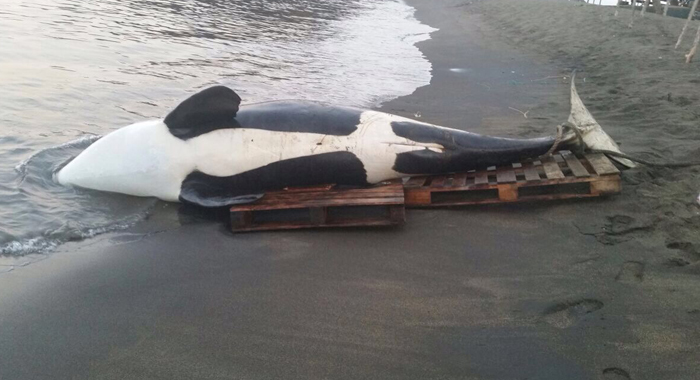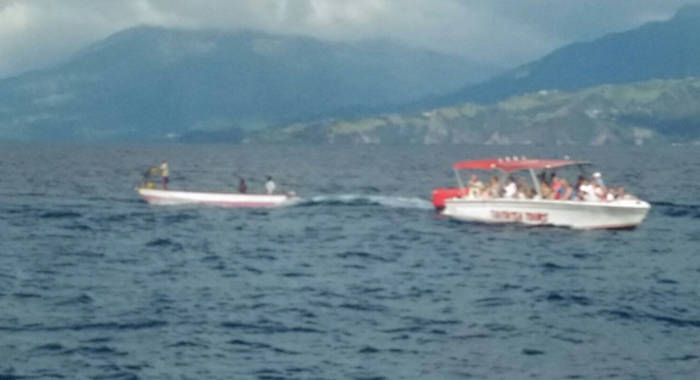The whaler who killed two orcas on March 30 has challenged the account of the whale watch tour operator who said the whalers killed half of the pod.
The whaler has further denied that tourists were around when the orcas died and have called for discretion on the part of whale watch tour operators and whalers.
The killing of the orcas has resulted in much negative press in the international media for St. Vincent and the Grenadines, where the decades-old hunting of pilot and humpback whales continue with international approval.
The most recent killing of the orcas brings to at least six, the number of orcas killed in Barrouallie since 2015.
The whaler did not identify himself when he relayed on We FM on Sunday what transpired during the March 30 incident.
The information he relayed suggests that he is Samuel Hazelwood, who has been whaling since he graduated secondary school decades ago.
He said that on March 30, he and his crew set out to sea around 7 a.m., as usual. They met quite a lot of pilot whales but the orcas were around “chasing the pilot whales whole morning so we couldn’t have caught any”.
He said they met another pod of pilot whales and were pursuing them. The orcas were pursuing the pilot whales also, but the whaler said they were not paying any attention to the orcas.

“If we catch pilot whales, we can catch about four, five, six. But, eventually, the pilot whale made a dive and they lost us. So we saw the orcas and it was getting late so we decided to take one or two in order to buy back our gas.
“… the two whale watching boats were nowhere around,” the whaler said.
He said the orcas dived and when the whalers were looking for them, they saw the two whale watching boats coming from the direction of Bequia.
“But because they were faster than us, they … passed inside of us…” the whaler said, adding that the whale watching boats got to the orcas before them.
“And they (whale watching boats) know for sure once we come there, we are going to try to harpoon one of the orcas. Some of the crowd in one of the whale watching boat were arguing. One of the guys in the whale watching boat told them, well no, they can’t really criticise us, they have to leave us alone.”
The whaler said one of the whale watching boats left and headed toward Walliabou but the other boat stayed.
He said the orcas dove and resurfaced ahead of them going towards Bequia.
“And I eventually harpooned one of the orcas. No tourist was there to see no killing of orcas out there. They only see us when I harpooned one,” he said.
“The other boat, after they … saw we shoot the orcas, they left and they went away
“… they’re mentioning in their report that we kill half the pod of orcas. That was not true. It was about 20 orcas was out there,” he said, adding that the orcas would split up in groups when hunting.
“Maybe you might have four here, four in another area. That’s the way they hunt. And if one makes a kill, all will go there and feast upon their prey,” he said.
“And when they say it was just maybe half the pod we killed, it was a lie,” he said.
The whaler said that when orcas are in the area it is very difficult to catch pilot whales.
“… it really makes life much harder for us in catching the pilot whale because it seems as though the pilot whale is their most attractive food that they like to eat.
“So, even when the people are making comments, they need to find out from us what transpired. We were out there whole morning.”
The whaler said that the whale watching boat that remained in the area probably wanted to cause confusion by staying in the area until the orca was harpooned.
“I am not opposed to those who are willing to do whale watching. I have no problem with them. But if they come and meet us chasing certain things, they should use their discretion; both of us should do the same thing too,” the whaler said.
The government has condemned the action of the whalers.
Prime Minister Ralph Gonsalves announced in Parliament last week Thursday, April 5, that his government will outlaw the killing of orcas and bottlenose dolphins in keeping with its international obligations.
The whaler, whom the government has sent to various countries, including Belize, Japan, Canada on fisheries related courses, said he has been whaling since graduating secondary school with passes in mathematics, English and biology.
He said that it is through whaling that he has earned everything that he owns.
“I make more money from the ‘black fish’ (pilot whale) industry than fishing dolphin (mahi-mahi) and kingfish. … The only time Barrouallie is bright is when black fish [is caught] and when seine fish [is caught] because each vendor will employ quite a lot of people and they depend on that to make a livelihood.
“The prime minister said the majority of Barrouallie people were opposed to what we did and that is not true…. Not because he might not hear a lot of people come and talk on radio, but just go around and you will find out what is going on,” the whaler said.
The pilot whale industry is very important to the economy of Barrouallie and the government will, this year, build a processing facility in the area.
However, the whaler said that when orcas are around, they go for two to three months without landing a pilot whale.
In St. Vincent and the Grenadines, whaling is also done in Bequia, where whalers are allowed four humpback whales annually as part of their 150-year-old traditions.
The whaler said he did some research recently which showed that the killer whale population is between 50,000 and 100,000.
“… if you have too much whale, there is going to be an imbalance in the amount of tuna and dolphin and kingfish that the fishing boats catch, because they consume quiet a lot of food also,” the whaler said.






